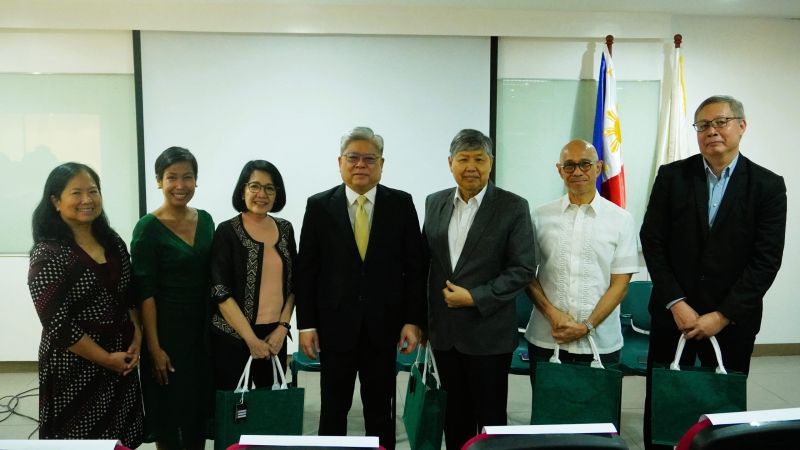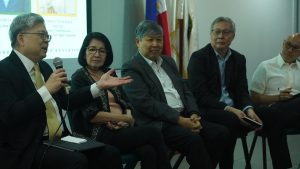UP CIDS HERPRP and FPPC Launch Conference Series on Higher Education Policy and Regulation

(L-R) Prof. Rosalie Alcala-Hall, Ph.D., Ms. Julia Andrea Abad, MA, Dr. Maria Cynthia Rose B. Bautista, Ph.D., Prof. Michael M. Alba, Ph.D., Prof. Emmanuel de Dios, Ph.D., Prof. Vicente K. Fabella, PhD., Prof. Philip Arnold Tuaño, Ph.D.
By: Ms. Marie Lara Pauline B. Bobier, MAMS
The University of the Philippines Center for Integrative and Development Studies (UP CIDS) Higher Education Research and Policy Reform Program (HERPRP), in partnership with the Far Eastern University Public Policy Center (FPPC), inaugurates the first session of a six-part conference series that discusses the economic and regulatory dimensions of Philippine higher education. The series centers on the pioneering research of Prof. Michael M. Alba, Ph.D., President of the FEU PPC and one of the research fellows under the UP President Edgardo J. Angara (UPPEJA) Fellowship.
Below is the coverage of each session:
- Conference 1: The Economic Bases of Regulating Higher Education
- Conference 2: CHEd’s De Facto Price Cap Regulation of Private Higher Education Institutions and its Historical Context
- Conference 3: Regulatory Independence of CHEd and Competitive Neutrality Between Public and Private Higher Education Institutions
- Conference 4: A Fiscal Overview of Higher Education Budgets in the General Appropriations Act and the Higher Education Development Fund from Fiscal Years 2010-2024
- Conference 5: The Natural Monopoly Cost Structure of Higher Education Institutions
- Conference 6: Regulatory Implications of Higher Education as Both an Experience and a Credence Good
The inaugural session feature welcome remarks from Prof. Rosalie Arcala-Hall, Ph.D., Executive Director of UP CIDS, and Ms. Julia Andrea Abad, MA, Executive Director of FPPC, who both underscore the significance of sustained policy dialogues in shaping the trajectory of Philippine higher education.

Prof. Alba presents his initial findings on the economic regulation of higher education, particularly addressing persistent market failures such as tuition inequities, information asymmetries, and the monopolistic cost structures of higher education institutions (HEIs). He further highlights the risks of government failure in direct state provision, often associated with bureaucratic inefficiencies, corruption, and policy volatility.
At the core of Prof. Alba’s argument is the proposal to establish an independent regulatory agency for HEIs—a body designed to operate insulated from politics, guided by clear mandates aligned with the national goals, and staffed by technical experts who can craft effective interventions, and capable of addressing market failures effectively. Such an institution, he argues, could foster transparency, accountability, and regulatory coherence while enabling higher education to contribute more effectively to the development of a globally competitive workforce, the preservation of Filipino identity and values, and the achievement of national welfare objectives.
Prof. Philip Arnold Tuaño, Ph.D., President of the Philippine Institute for Development Studies, stresses the importance of political independence, inter-agency coordination, and the agency’s technical and financial capacity. He also emphasizes the need to balance institutional autonomy with accountability, while safeguarding diversity and academic freedom.
Dr. Maria Cynthia Rose B. Bautista, Ph.D., former Commissioner of the Commission on Higher Education, echoes the potential of a quasi-independent body to foster transparency and fairness. She emphasizes the value of incentive structures that align higher education outcomes with national development goals.
Other distinguished panelists include Prof. Vicente K. Fabella, Ph.D., President of Jose Rizal University, and Prof. Emmanuel de Dios, Ph.D., Professor Emeritus at the UP School of Economics, who contribute further institutional and economic perspectives to the discussion.
The Higher Education Seminar Series is free to all and will run every last Wednesday of the month for September, October, and November, and on the first Wednesday of December 2025. To reserve a seat, please email [email protected] or call 0927 883 6039.